Treatment of Joint Arthritis (Foot Arthritis)
Millions of humans are plagued by the pains of foot arthritis, especially as we age. It is a chronic, degenerative condition in which your joints lose their normal surfaces over time. This degeneration leads to decreased motion, inflammation and pain. There are many causes of arthritis including overuse, injuries, and genetics.
Office Appointments and Telemedicine with Dr. Carreira

You can also book an office appointment or a telemedicine visit by calling Dr. Carreira’s office at 404-355-0743. Book now.
The mainstay of therapy is to relieve the pain. Listed below are the treatment options for the relief of your condition.

The following treatment options may be initiated for foot arthritis:
- NSAIDs (naproxen, ibuprofen, motrin, celebrex, etc.): Short courses of these non-steroidal anti-inflammatories are recommended. Please take with food. This medication should be checked with your primary care physician to make sure that it is safe for you to take.
- Activity modification: If it is painful to do a certain activity, try to limit this activity until the pain has improved, and then resume gradually. It may be helpful and acceptable to you to avoid impact activities like running, jumping and contact sports. Pool therapy is a great way to offload weight on the joints while maintaining a cardiovascular workout.
- Weight Loss: Extra weight placed on your joints leads to extra stress on these areas. Weight loss may lessen your pain.
- Glucosamine/Chondroitin: This over-the-counter supplement is controversial for joint health. Some studies have shown benefits related to joints and joint disease. This can be found at any local pharmacy like Publix, Target, and Cosco. Rare side effects include GI irritation.
- Injections (Steroids or Hyaluronic acid): The injection into your joint is to help decrease inflammation and pain. This rarely provides long-term relief and length of relief varies.
- Surgery: If all else fails, surgery may be performed arthroscopically (through small portal incisions) or open. The type of surgery depends on the location, extent of arthritis, and any associated abnormalities.
Dr. Dominic Carreira regularly posts related videos on his YouTube Channel.


